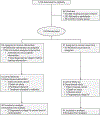Effect of home-based resistance training on chemotherapy relative dose intensity and tolerability in colon cancer: The FORCE randomized control trial
- PMID: 38265970
- PMCID: PMC11058014
- DOI: 10.1002/cncr.35204
Effect of home-based resistance training on chemotherapy relative dose intensity and tolerability in colon cancer: The FORCE randomized control trial
Abstract
Background: Many patients with colon cancer cannot fully adhere to postoperative chemotherapy due to dose-limiting toxicities, resulting in lower relative dose intensity (RDI) and potentially compromising overall survival. This study examined whether home-based resistance training (RT) during adjuvant chemotherapy improves RDI and patient-reported toxicities versus usual care (UC) in colon cancer patients.
Methods: Multicenter, randomized control trial (RCT) conducted at community and academic practices. Enrollment of patients receiving postoperative chemotherapy for colon cancer occurred between February 23, 2018, and September 29, 2021; final follow-up was March 21, 2022. Participants were randomized to RT (n = 90) or UC (n = 91) for the duration of chemotherapy. Participants in the RT group engaged in twice weekly home-based progressive RT. At the end of the study, UC was given an online exercise program.
Results: Among 181 randomized patients (mean age, 55.2 [SD, 12.8] years, 95 [52.5%] were men), there were no differences in the mean RDI among those in RT (79% [SD, 19%]) and those in UC (82% [SD, 19%]); (mean difference -0.04 [95% confidence interval (CI), -0.09 to 0.02]). Assignment to RT did not significantly reduce the number of moderate/severe symptoms per week across follow-up (relative rate: 0.94 [95% CI, 0.72-1.22]). Additionally, time since randomization did not significantly modify the effect of RT on the overall number of symptoms (p = .06).
Conclusions: Among patients with colon cancer, these results do not support home-based RT as an adjunct to chemotherapy specifically to improve planned treatment intensity.
Keywords: colon cancer; exercise; randomized trial; relative dose intensity.
© 2024 American Cancer Society.
Conflict of interest statement
Figures




References
-
- Bland KA, Zadravec K, Landry T, Weller S, Meyers L, Campbell KL. Impact of exercise on chemotherapy completion rate: A systematic review of the evidence and recommendations for future exercise oncology research. Crit Rev Oncol Hematol. Apr 2019;136:79–85. doi:10.1016/j.critrevonc.2019.02.005 - DOI - PubMed
-
- Lund CM, Dolin TG, Mikkelsen MK, Juhl CB, Vinther A, Nielsen DL. Effect of Exercise on Physical Function and Psychological Well-being in Older Patients With Colorectal Cancer Receiving Chemotherapy-A Systematic Review. Clin Colorectal Cancer. Dec 2020;19(4):e243–e257. doi:10.1016/j.clcc.2020.05.012 - DOI - PubMed
Publication types
MeSH terms
Grants and funding
LinkOut - more resources
Full Text Sources

